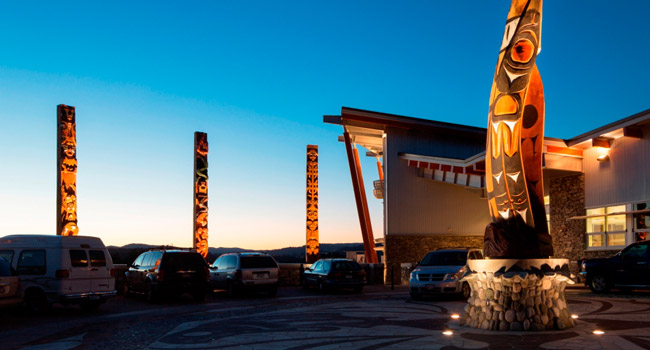A shining example of how First Nations are learning to prosper with tax jurisdiction.
Thirty years ago the Wellness Centre was a community dream, eight years ago a Songhees Committee started the process of making the dream a reality, and on January 22, 2014, the Songhees Nation celebrated the grand opening of their long-awaited Centre. The Songhees Nation, located on southeastern Vancouver Island near the City of Victoria, had first conceived of building a gym to house after-school and evening activities for the youth.
In 2005 the Songhees Nation and the Government of Canada settled the Rail Spur Claim, and the Songhees Council was able to set aside funds to begin the process of planning for their gym.
At that time, a community committee was formed to research and plan the facility. The committee and the Council collected the ideas with the guideline “if we could have anything we want, what would it look like?”
Songhees has a limited land base and its government was operating out of a number of different buildings. The community wanted a facility where all of the programs and services could be housed in one location. They wanted a gathering place for all community members, from children to elders, as well as the ability to offer sports training, job training and arts and culture programs.
The Community came together and was very proud of the resulting plan. It included all of the aspects they felt the community required to thrive.
Songhees applied for government funding for the facility, and received only $1m out of the $24m required to build. Songhees began to think out of the box and, not wanting to diminish the community’s vision, came up with a strategy to fund the building on their own. Songhees implemented the First Nations Goods and Services Tax (FNGST) and entered into a revenue sharing agreement with Canada. That revenue stream, along with a lease agreement, was enough to securitize a long-term loan.
During this process, Songhees was working with the First Nations Tax Commission on implementing the First Nations Fiscal Management Act (FMA). In 2008, Songhees became the first First Nation in Canada to pass taxation and assessment laws under the FMA (they initially began collecting property tax under the Indian Act in 1995). Songhees is certified by the First Nations Financial Management Board, is a borrowing member of the First Nations Finance Authority as has passed a Financial Administration Law.
The Songhees Nation and its Wellness Centre is a shining example of how First Nations are learning to prosper outside of the Indian Act and government funding. Songhees credits the success to community involvement and support from the First Nation fiscal institutions.
Songhees invites those interested in learning more about the Centre and how they completed this project to contact them: https://www.songheesnation.ca/

